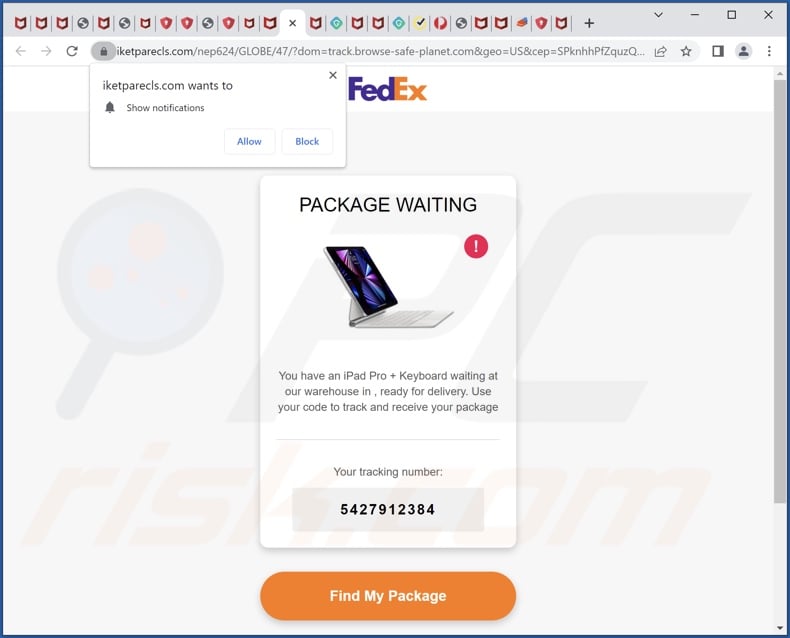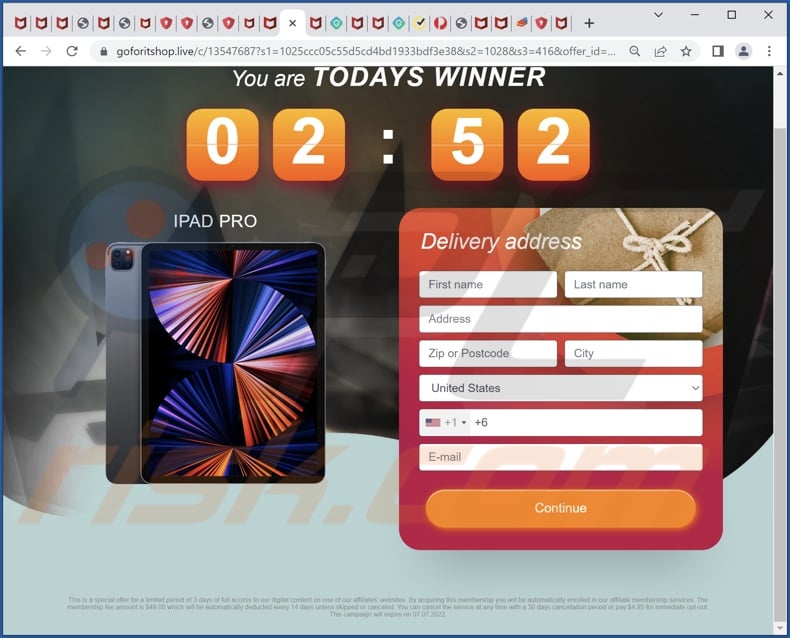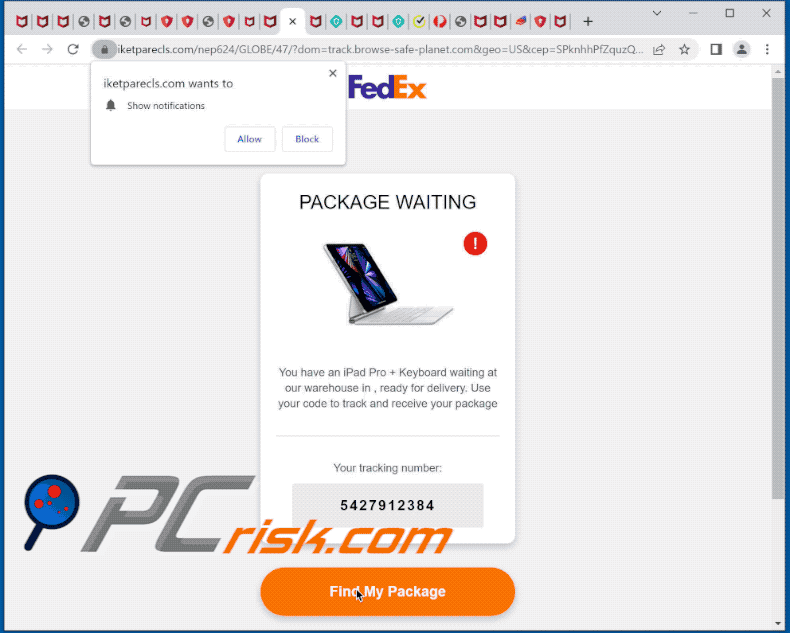Avoid getting scamming by fake "FedEx PACKAGE WAITING" websites
Phishing/ScamAlso Known As: FedEx PACKAGE WAITING scam website
Get free scan and check if your device is infected.
Remove it nowTo use full-featured product, you have to purchase a license for Combo Cleaner. Seven days free trial available. Combo Cleaner is owned and operated by RCS LT, the parent company of PCRisk.com.
What is "FedEx PACKAGE WAITING"?
While inspecting spam browser notifications, our research team found the "FedEx PACKAGE WAITING" scam. This scheme operates as a phishing scam, with the additional goal of tricking victims into subscribing to a paid service.
It must be emphasized that all the claims made by this scam are false, and it is in no way associated with the actual FedEx Corporation.

"FedEx PACKAGE WAITING" scam overview
The scam states that users have a package pending delivery, which contains an iPad Pro with a keyboard. After the "Find My Package" button is clicked, users are presented with the nonexistent package's details. Once "Schedule My Delivery Now" is clicked, the page lists a couple of delivery options. The fake delivery details are then confirmed, and a "Get My Package" button is displayed. Pressing this button results in a redirect to a different site.
The page claims that the visitor is "TODAYS WINNER" of an iPad Pro. To receive the prize, the scam instructs victims to provide their delivery details - full names, addresses, telephone numbers, and email addresses.
The small print of the webpage states that this is a sign-up for a three-day trial to access an affiliate website's content. By signing up - users will be automatically included as a member. The membership will cost 48.00 USD, and this sum will be billed every two weeks until it is canceled. The cancellation period is stated to be thirty days, while immediate opt-out costs 4.95 USD.
Phishing scams use the obtained data to craft personalized scams or sell it to third-parties (potentially, cyber criminals). Furthermore, if the bogus subscription services of the "FedEx PACKAGE WAITING" scam are functional, this means that users will be continuously billed every two weeks.
To summarize, victims of this scam can experience serious privacy issues, significant financial losses, and even identity theft.
If you have disclosed private information to "FedEx PACKAGE WAITING" - immediately contact the appropriate authorities.
| Name | FedEx PACKAGE WAITING scam website |
| Threat Type | Phishing, Scam, Social Engineering, Fraud |
| Fake Claim | Package containing an iPad Pro is awaiting delivery. |
| Disguise | FedEx |
| Related Domains | iketparecls[.]com, iketrest[.]com |
| Detection Names | alphaMountain.ai (Phishing), Combo Cleaner (Phishing), CRDF (Malicious), Forcepoint ThreatSeeker (Phishing), Kaspersky (Phishing), Full List Of Detections (VirusTotal) |
| Serving IP Address | 172.67.147.36 |
| Distribution methods | Compromised websites, rogue online pop-up ads, potentially unwanted applications. |
| Damage | Loss of sensitive private information, monetary loss, identity theft, possible malware infections. |
| Malware Removal (Windows) |
To eliminate possible malware infections, scan your computer with legitimate antivirus software. Our security researchers recommend using Combo Cleaner. Download Combo CleanerTo use full-featured product, you have to purchase a license for Combo Cleaner. 7 days free trial available. Combo Cleaner is owned and operated by RCS LT, the parent company of PCRisk.com. |
Similar scam examples
We have analyzed hundreds of scams similar to "FedEx PACKAGE WAITING"; "Win A New iPhone 13", "You've made the 16.39-billionth search!", "Chrome Search Contest 2022" - are merely a few examples.
Online scams use a wide variety of models, and they can have different aims. However, the end-goal of all scams is to generate revenue at victims' expense. Therefore, we strongly advise exercising caution when browsing.
How did I open a scam website?
Deceptive websites can be force-opened by pages that use rogue advertising networks - this can occur immediately upon access or when hosted content is clicked (e.g., links, buttons, ads, etc.). Mistyping a website's URL can also result in a redirect landing on a scam site.
Spam browser notifications and intrusive advertisements endorse online scams as well. The presence of adware on a system can lead to the display of intrusive ads, as well as reoccurring rogue redirects to deceptive webpages.
How to avoid visiting scam websites?
Scam sites are mainly accessed via redirects caused by websites using rogue advertising networks, mistyped URLs, spam browser notifications, intrusive ads, or installed adware.
Therefore, we advise against using sites that offer pirated programs/media or other questionable services (e.g., Torrenting, illegal streaming and downloading, etc.) as they are usually monetized through rogue advertising networks. Additionally, we recommend being cautious when entering URLs.
To avoid receiving deceptive browser notifications, do not consent to their delivery from suspicious webpages (i.e., do not click "Allow", "Allow Notifications", etc.). Instead, ignore or deny notification delivery requests (i.e., select "Block", "Block Notifications", etc.).
To avoid installing harmful software - download only from official/verified sources and approach installation processes with care (e.g., read terms, use "Custom/Advanced" settings, opt-out of all additions, etc.). If your computer is already infected, we recommend running a scan with Combo Cleaner Antivirus for Windows to automatically eliminate all threats.
Text presented in the "FedEx PACKAGE WAITING" scam:
FedEx
PACKAGE WAITING
You have an iPad Pro + Keyboard waiting at our warehouse in , ready for delivery. Use your code to track and receive your package
Your tracking number:
5427912384
Find My Package
Screenshot of the phishing website that the "FedEx PACKAGE WAITING" scam redirects to:

Text presented at the bottom of this page:
This is a special offer for a limited period of 3 days of full access to our digital content on one of our affiliates’ websites. By acquiring this membership you will be automatically enrolled in our affiliate membership services. The membership fee amount is $48.00 which will be automatically deducted every 14 days unless skipped or canceled. You can cancel the service at any time with a 30 days cancellation period or pay $4.95 for immediate opt-out. This campaign will expire on 07.07.2022.
Screenshots of spam browser notifications used to promote the "FedEx PACKAGE WAITING" scam:
The appearance of "FedEx PACKAGE WAITING" pop-up scam (GIF):

Other examples of FedEx PACKAGE WAITING pop-up scam variants:
Instant automatic malware removal:
Manual threat removal might be a lengthy and complicated process that requires advanced IT skills. Combo Cleaner is a professional automatic malware removal tool that is recommended to get rid of malware. Download it by clicking the button below:
DOWNLOAD Combo CleanerBy downloading any software listed on this website you agree to our Privacy Policy and Terms of Use. To use full-featured product, you have to purchase a license for Combo Cleaner. 7 days free trial available. Combo Cleaner is owned and operated by RCS LT, the parent company of PCRisk.com.
Quick menu:
- What is FedEx PACKAGE WAITING scam website?
- How to identify a pop-up scam?
- How do pop-up scams work?
- How to remove fake pop-ups?
- How to prevent fake pop-ups?
- What to do if you fell for a pop-up scam?
How to identify a pop-up scam?
Pop-up windows with various fake messages are a common type of lures cybercriminals use. They collect sensitive personal data, trick Internet users into calling fake tech support numbers, subscribe to useless online services, invest in shady cryptocurrency schemes, etc.
While in the majority of cases these pop-ups don't infect users' devices with malware, they can cause direct monetary loss or could result in identity theft.
Cybercriminals strive to create their rogue pop-up windows to look trustworthy, however, scams typically have the following characteristics:
- Spelling mistakes and non-professional images - Closely inspect the information displayed in a pop-up. Spelling mistakes and unprofessional images could be a sign of a scam.
- Sense of urgency - Countdown timer with a couple of minutes on it, asking you to enter your personal information or subscribe to some online service.
- Statements that you won something - If you haven't participated in a lottery, online competition, etc., and you see a pop-up window stating that you won.
- Computer or mobile device scan - A pop-up window that scans your device and informs of detected issues - is undoubtedly a scam; webpages cannot perform such actions.
- Exclusivity - Pop-up windows stating that only you are given secret access to a financial scheme that can quickly make you rich.
Example of a pop-up scam:

How do pop-up scams work?
Cybercriminals and deceptive marketers usually use various advertising networks, search engine poisoning techniques, and shady websites to generate traffic to their pop-ups. Users land on their online lures after clicking on fake download buttons, using a torrent website, or simply clicking on an Internet search engine result.
Based on users' location and device information, they are presented with a scam pop-up. Lures presented in such pop-ups range from get-rich-quick schemes to fake virus scans.
How to remove fake pop-ups?
In most cases, pop-up scams do not infect users' devices with malware. If you encountered a scam pop-up, simply closing it should be enough. In some cases scam, pop-ups may be hard to close; in such cases - close your Internet browser and restart it.
In extremely rare cases, you might need to reset your Internet browser. For this, use our instructions explaining how to reset Internet browser settings.
How to prevent fake pop-ups?
To prevent seeing pop-up scams, you should visit only reputable websites. Torrent, Crack, free online movie streaming, YouTube video download, and other websites of similar reputation commonly redirect Internet users to pop-up scams.
To minimize the risk of encountering pop-up scams, you should keep your Internet browsers up-to-date and use reputable anti-malware application. For this purpose, we recommend Combo Cleaner Antivirus for Windows.
What to do if you fell for a pop-up scam?
This depends on the type of scam that you fell for. Most commonly, pop-up scams try to trick users into sending money, giving away personal information, or giving access to one's device.
- If you sent money to scammers: You should contact your financial institution and explain that you were scammed. If informed promptly, there's a chance to get your money back.
- If you gave away your personal information: You should change your passwords and enable two-factor authentication in all online services that you use. Visit Federal Trade Commission to report identity theft and get personalized recovery steps.
- If you let scammers connect to your device: You should scan your computer with reputable anti-malware (we recommend Combo Cleaner Antivirus for Windows) - cyber criminals could have planted trojans, keyloggers, and other malware, don't use your computer until removing possible threats.
- Help other Internet users: report Internet scams to Federal Trade Commission.
Frequently Asked Questions (FAQ)
What is a pop-up scam?
Pop-up scams are deceptive messages designed to trick users into disclosing private information, signing up for bogus subscriptions/services, making monetary transactions, downloading/installing and/or purchasing software, or performing other actions.
What is the purpose of a pop-up scam?
Pop-up scams are designed to generate revenue. The scammers may profit by obtaining funds through deception, abusing or selling private data, promoting applications, spreading malware, and so forth.
I have provided my personal information when tricked by a pop-up scam, what should I do?
If you have provided personally identifiable or other sensitive data (e.g., ID card details, credit card numbers, etc.) - immediately contact relevant authorities. And if you've disclosed account credentials - change the passwords of all possibly compromised accounts and inform their official support without delay.
Why do I encounter fake pop-ups?
Pop-up scams are promoted on various rogue websites. Most access them via redirects caused by sites using rogue advertising networks, mistyped URLs, spam browser notifications, intrusive ads, or installed adware.
Will Combo Cleaner protect me from pop-up scams?
Combo Cleaner is capable of scanning websites and detecting deceptive/malicious ones. Therefore, if you access such a webpage - you will be warned immediately. Additionally, Combo Cleaner will restrict all further access to dangerous sites.
Share:

Tomas Meskauskas
Expert security researcher, professional malware analyst
I am passionate about computer security and technology. I have an experience of over 10 years working in various companies related to computer technical issue solving and Internet security. I have been working as an author and editor for pcrisk.com since 2010. Follow me on Twitter and LinkedIn to stay informed about the latest online security threats.
PCrisk security portal is brought by a company RCS LT.
Joined forces of security researchers help educate computer users about the latest online security threats. More information about the company RCS LT.
Our malware removal guides are free. However, if you want to support us you can send us a donation.
DonatePCrisk security portal is brought by a company RCS LT.
Joined forces of security researchers help educate computer users about the latest online security threats. More information about the company RCS LT.
Our malware removal guides are free. However, if you want to support us you can send us a donation.
Donate






▼ Show Discussion